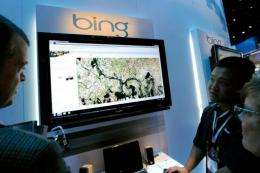Facebook and Bing fuse social network and search

Facebook and Microsoft began personalizing Internet queries on Wednesday, letting people add the recommendations of friends at the social network to search results.
Facebook profiles and feedback regarding what friends like were being woven into Bing searches for people who agree to let a free software module access the information.
"This is just the beginning; there is going to be a whole lot more to come over time," Facebook founder Mark Zuckerberg said as the collaboration was revealed at an event at Microsoft's campus in Mountain View, California.
"I couldn't think of anyone better to work with on the next generation of search," he said. "The people at Microsoft really are the underdog, and they are incentivized to go out and innovate."
The new "social search" features will be available when people are logged into Facebook while searching on Bing. Roll-out began on Wednesday and was expected to be completed in the coming months.
"With a partnership of Facebook and Bing we will be able to harness and unlock the tremendous implications of social platforms and take search to a new level," said Microsoft president of online services Qi Liu.
"People can truly become first-class citizens of a search experience."
Likes, interests and other information shared at Facebook hold the potential to let search engines tailor online searches to individuals and personalize results.
"Today's Internet is a graph of links, and on the other side there is the social graph," Liu said. "You can overlay a person's interests, topics, events and more into a search engine to tap into more predictive powers."
Examples of social search at Bing included queries for restaurants yielding results that included eateries Facebook friends indicated were to their liking.
Searches on people's names are improved with the addition of public profiles at Facebook and mutual friends at the social network, which boasts more than 500 million members worldwide.
Information from or about people in our lives holds a powerful attraction, according to Zuckerberg.
"We are just hard wired so that information about people is indeed the most important information in the world," said Zuckerberg, who was a Harvard student when he started Facebook in 2004.
"A huge amount of people's brains is focused entirely about processing information about people -- faces, emotions," he said.
Microsoft's partnership with Facebook dates back four years to when the social networking service had just 100 employees and seven million members.
"You guys got us early," Zuckerberg quipped while talking on-stage at the Microsoft campus.
Microsoft paid 240 million dollars in late 2007 for a 1.6 percent stake in Facebook. Bing is used to power Internet searches at the social network.
"We knew it was a special company and they were going to change the world in ways we couldn't even imagine," said Microsoft senior vice president of online audience Yusuf Mehdi. "We are impressed with how Facebook has pressed the Internet to be more social and open."
A pop-up box will offer first-time users the option of declining the Bing social search option, which people can opt out of at any time.
Zuckerberg said that private information at Facebook isn't shown to Bing and that data regarding searches is not shared with the social network.
"This is all information that is public about you anyway," Zuckerberg said.
Bing has been striving to close ground on Internet search king Google, which is also eyeing ways of making searches more personal and social.
Google's share of the core US search market grew to 66.1 percent in September, evidently due to a new "Instant" feature that delivers suggested results with each query letter typed, according to industry tracker comScore.
Microsoft's portion of the market improved a fraction to 11.2 percent while that of Yahoo! slipped from 17.4 percent in August to 16.7 in September, comScore reported Wednesday.
Approximately 12.4 billion dollars will be spent this year on ads at search engines, with Google expected to rake in 73.3 percent of that cash, according to eMarketer.
(c) 2010 AFP



















